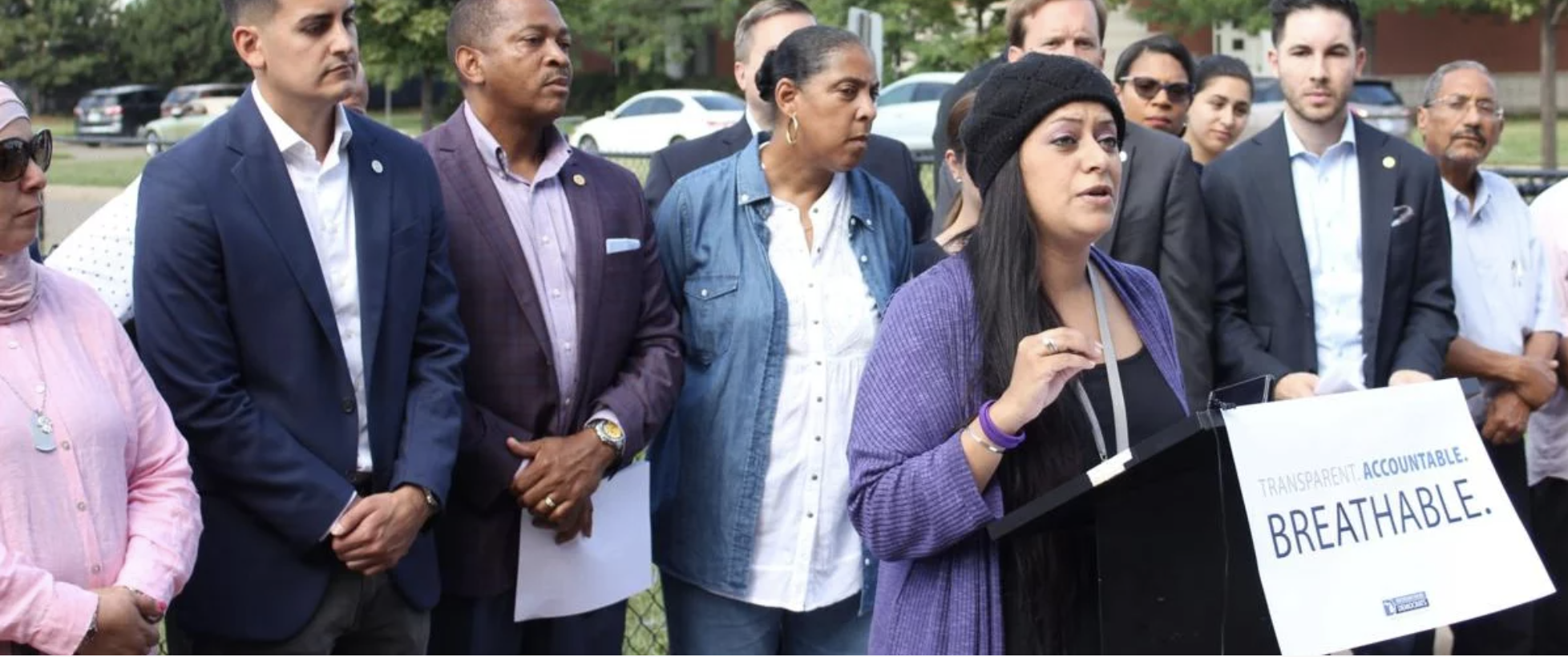By Simon Albaugh – Yemeni American News
Dearborn, Mich. – Being the top vote-getter in Dearborn’s Yemeni American Community comes with the responsibility of an entire neighborhood, lost, as many see it, from the benefit of Dearborn’s government. Haphazardly stuck among heavy industry and chemical pollutants, Dearborn’s Southend needs representation.
Samraa Luqman earned 4,165 votes in the August Primary for Dearborn City Council. This secured the Southend-based activist a spot on the ballot for November’s general elections. Having spent the majority of her life living in the working-class neighborhood, her campaign continues to be defined by advocacy for her own small community.
“I wouldn’t be running if I felt like I had adequate representation,” Luqman said. “That’s the bottom line.”
Luqman moved to the Southend at six years old, having moved from Chicago with her family. Her father, a Veteran of the Korean War, became a Physician and later served as Chief of Medicine for the U.S. Department of Veteran’s Affairs. Luqman’s mother was a local activist, starting a nonprofit known as the American Yemeni Women’s Association (AYWA).
The influence of both her parents became the backbone for her direction toward community service, explains Luqman.
“My dad was an Army Major, he was working with the VA,” Luqman said. “And we’d go visit him three times a year. When I was twelve, he got me volunteering at the VA. So community service started there.
“My mom, when I was 18, had established a nonprofit organization. So from there, I started attending townhalls, city council, zoning board and different things speaking out. And that’s kind of where I was taking my baby steps and learning.”
Now, you can often find Luqman speaking during Dearborn public meetings about the disparities in city services – for every $60 in recreation dollars spent in the Southend, $140 is spent in the surrounding areas. During the protests against the city’s response to flooding in the southend, Luqman rallied with protesters as well.
But one of the most pressing issues that Samraa rallies for is environmental justice reform for her community. Since the time of Mayor Orville Hubbard, the area has been a magnet for heavy industry that often produces a toxic environment for those who live in the neighborhood. And according to Professor Sally Howell’s research, this was by design.
“In the 1950s the city of Dearborn, Michigan, led by Mayor Orville Hubbard, began a campaign to declare the Southend neighborhood a “blighted area,” evict its ethnically diverse, working class residents, and turn their properties over to the Ford Motor Company and the Edward C. Levy Company for development as an “industrial park,” writes Professor Howell.
Although this area hadn’t become a majority-Arab region of the city yet, its location, described by Luqman as a “landing mat” for immigrants in the metro Detroit region was already well into its beginning.
The aftereffects of this heavy industry are felt in the funerals of many in the Southend. Cancer rates in the neighborhood are astronomical, leaving most residents with a loss from the disease.
“I started noticing on my street,” Luqman said. “My neighbor immediately to my left across the street, she died of breast cancer. To my right, a few doors down, her dad died of kidney cancer. And when you go down a few more doors, another young girl that I went to school with died in her twenties of breast cancer.”
The link between residing close to heavy industry and high rates of cancer have been well documented by medical researchers. All of these complications point to a renewed effort for representation in the Southend, calling for someone to be a part of the decision-making that impacts their own neighborhood.
Samraa met us in a small coffee shop in Garden City, just near the border of Dearborn. She recited statistics about cancer rates, city spending, and almost a complete absence of representation from the Southend – according to Samraa there’s only one appointee still serving the city from her neighborhood.
As the general election approaches, she talked about the challenge of racing. And the inspiration that drives her to continue her campaign.
“I don’t have the time to do this interview,” Luqman tells the Yemeni American News. “I don’t have the luxury of time for going to meetings and running for council. It’s not a luxury, and it’s not a next step in my career. It’s something I want to give back to the community. I’m driven by necessity, I’m driven by desperation of people who are literally dying from pollution and from negligence.”













